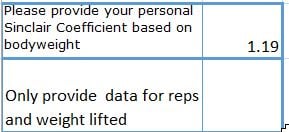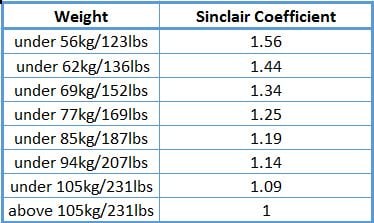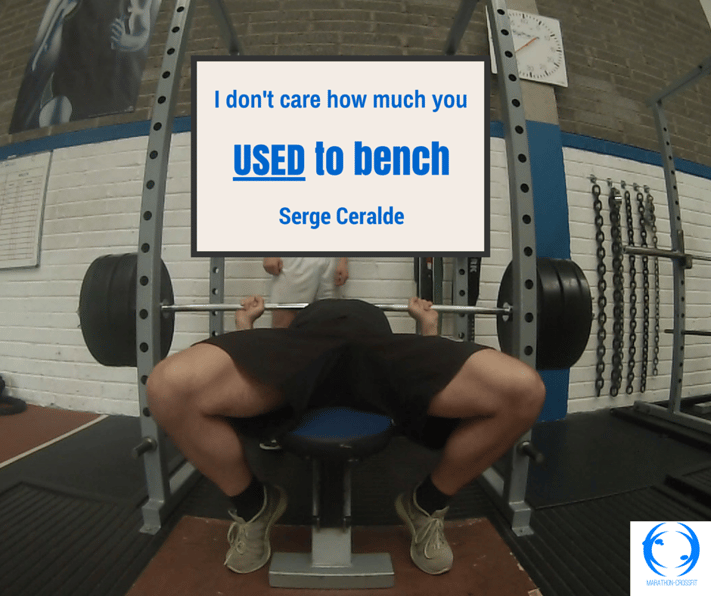Bench Press Calculator
This bench press calculator is made for you to save you about a week of research. You can skip my rambling and just download the free excel spreadsheet at the end or spent the time to learn how to use it and maybe pick up a tip or two. You will be provided with data based on your own performance on your 1RM, dynamic bench press ad Sinclair coefficient.
Intro
This bench press calculator is intended to help you to track your development on your bench press over a longer period of time independently from which weightlifting program you are on. No matter whether you are on Stronglifts 5x5, the 5 3 1 workout,
Some programs will make you stronger quicker, others will give you more muscle than strength, but in the
Don't know where to start? Good goals would be bodyweight bench press, 100kg bench press, 2 times bodyweight, 200 kg and so further. At least that worked for me.
Other calculators
There are definitely other calculators out there. What I found is that they are usually tied to the website that they are incorporated in or part of a bigger spreadsheet within a program that has been designed. That is no problem if you want to do the research yourself, always want to come back to that web page to recalculate or stick with one program, however, that might not necessarily be the case.
What I have designed is no rocket science. It is simple and easy to use and the result of two years of lifting experience. I put the most important numbers together for you to use and become better. This is common, publicly available knowledge, combined with a bit of rudimentary excel skills. I hope you will find it helpful.
Repetitions

In this section, you will provide the repetitions that you have done. It can be discussed
- Touch and go bench press
Some people call these cheater presses as you do not pause on the chest at the bottom of the lift and they will not count in official powerlifting events. These are easier to perform than paused bench presses. I personally find them useful in all out sets / top sets in 531, even though some might say that is also cheating. I found them to be fine and good to push yourself to the very limit.
- Paused bench presses
Paused bench presses involve to bring the barbell to the chest, let it lose all momentum and finish the press up from there. This makes the movement a lot harder as it is physically harder to move an object that has come to a full stop rather than one that only has to change direction as in the touch and go bench press. For me personally, this variation is very helpful to ensure that I train my full chest and to develop more muscle and work with less volume as for touch and go presses.
- Ballistic / Dynamic benching
A phrase that I am reusing from Louie Simmons, himself strength coach at Westside Barbell and known for establishing the westside method. This form of bench pressing usually involves chains and/or bands. The load is relatively low compared to your one repetition maximum and your aim is to finish the movement as explosive as possible. With touch and go benching you usually go for as many repetitions as possible at a reasonable high load for yourself to build muscle and strength. With ballistic benching, you do 2 - 4 repetitions and try to move the bar as fast as you possibly can. This is all about explosiveness. Usually, the least utilized exercise of the three as most gyms either do not provide or allow for the use of chains and bands. So if you find a place where guys make use of this, you found a place serious about strength.
In whatever way you like to do your bench pressing, provide the repetitions done for this calculator in the corresponding column.
Weight

In the weight section, you provide the number of repetitions you have done for the particular exercise. The calculator works for pounds and kilogram alike, so don't worry about that. However make sure that you include the weight of the barbell when you lift or make it explicitly clear for you and others, that the data you provide is excluding the barbell.
Common practice is to count the barbell against your total, as it has a weight of its own, that has to be lifted. Usually, the weight of the barbell is 20kg / 45lbs, unless it is a special bar. Rest assured, that the most barbells you will find in your local gym have this weight. Exemptions are technique bars,
If you are unsure how much weight to use here are some rule of thumbs based on my experience, if you have no program yet, which helps you with your numbers:
10 repetitions = Use 40% - 60% of your one repetition maximum
5 repetitions = Use 60% - 85% of 1RM
1 - 3 repetitions = Use 75% to 95%
These numbers are a guideline if you found this post just starting out with lifting. If you do not have a program, please research one on this web page or stick your head together with your personal trainer. Training without knowing why you are doing how many repetitions under which load to reach a specific goal is a waste of your time and money. (money you might have a lot, but time on this earth is always limited, use it wisely).
One repetition maximum

These fields will auto update based on a formula integrated into the spreadsheet. This formula is commonly used to calculate one repetition maximums and will show you during your training whether you are getting stronger or not without having to undergo a one repetition maximum test in each session. This is usually impractical and dangerous, so the calculations are a good precursor to seeing whether you are on track or not without putting yourself under too much strain and risking injury. Please keep in mind that only one repetition lifted in real life actually count and that the calculation is always an estimate. Especially high repetition training of bodybuilders has the tendency to show less than expected carry over to a one repetition maximum. Please be careful when testing one repetition maximums and always get help in case something unexpected is going to happen. Also, test slightly below your calculated maxima, to be on the safe side.
From my personal experience, I can only recommend this as I expected to run a marathon under 3 hours based on my calculated VO2 maxes ( think of this as the running equivalent of a calculated one repetition maximum bench press ). I failed twice, even though I had the needed "calculated" output. Take this to heart, otherwise, you might
Sinclair Coefficient


The Sinclair coefficient is provided in this calculator to stop you and your bros from bragging and haggling who is the best. As lifting evolved there was a constant debate between smaller and bigger lifters about who were the strongest.
The big lifters made an argument for the overall amount of weight lifted, as they inevitably lifted more than their lighter competitors as their size puts them at an advantage regarding overall weight lifted.
The smaller lifters made an argument for being stronger, because they lifted their own weight many times over, whereas the bigger lifters struggled to lift more than two times their own body weight.
As this argument could not be decided without providing some comparable facts based on science the Sinclair coefficient was developed and established as a way to compare the strength of different weightlifters in different weight classes.
For this calculator, please pick the coefficient which applies to yourself based on your body weight and provides this at the top to tailor the bench press calculator to you. If you and your bros all use the calculator based on the Sinclair coefficient there will be no doubt who benches the most. Of course, that takes out a bit of the fun of squabbling but could push all of you to new heights. Maybe give it a try.
Dynamic

The dynamic column shows you 50% of your one repetition maximum in this bench press calculator. This, for me, is and was always a good number to work with for dynamic/ballistic benching, warm up sets for heavier loads and a good number to work around for
For warm up sets, depending on your program, you usually will have some 50% sets in there. For dynamic,
Advanced Techniques
This bench press calculator is mainly based on percentages from 1RM. Newer programs ask for auto-regulation and velocity based training. To measure velocity in your lifts and auto-regulate based on this you will need equipment in the range of 200€ / 250$ to accomplish that. Chris Duffin, a world record holding powerlifter, coaches with this method and also gets good results himself. This is something to get into from my perspective, once you are not just using the template I provided, but understand the underlying principles and why I put them on this calculator.
Own experience
For credibilities sake, my current bench press is at 300pounfs at 82kg body weight at the time of writing. This makes me not an outstanding
Conclusion
This is a downloadable, reusable, program independent, excel based calculator which is yours to use. It is based on principles which I applied successfully to me training based on the input of world-class lifters lJimJoim Wendler, Ed Coan, Chris Duffin and Layne Norton. Enjoy it and share with your friends, if you deem it worthy.


